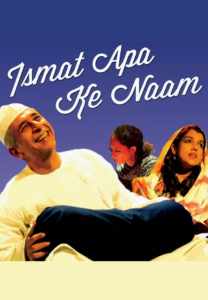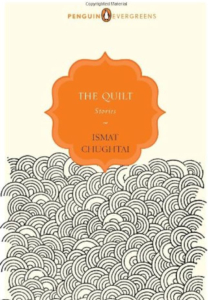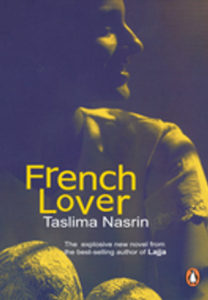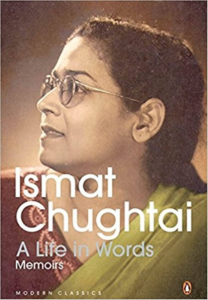Book Review
1. The Quilt and other Stories – Ismat Chughtai
Ismat Chughtai is a prominent female figure in Urdu Literature. She is the first Muslim woman in India to secure both B. A and B.Ed. degrees. She is better known for her controversial short stories. She fought 4 years in Lahore court in 1944 and won the case against obscenity, lesbianism, and blasphemy arraigned on her short story- The Quilt. Feminist? I don’t think so. Her female characters celebrate womanhood to the tilt. That’s all.
A tribute to Ismat Chughtai

Ismat Apa Ke Naam is a Hindi play directed by Naseeruddin Shah starring Shah, his wife Ratna Pathak Shah, and their daughter Heeba Shah. It’s one act one-man show. Each actor enacts one story. Of course, the 3 the stories are that of Ismat Chughtai! It’s been a huge success in India and abroad. Pity Begum Chughtai is not around to enjoy the show.
2. The Quilt and other Stories

First of my Penguin Evergreens. Wonder why Penguin cover designs are so drab and dull. Evergreens are a wee bit better than the normal editions. Anyways… There are 10 short stories including the much disputed The Quilt. I find Gainda most endearing followed by The Homemaker and Touch-Me-Not. The women in all the stories are quite feminine, strong, heady, and passionate. Kudos to Ismat Chughtai. Cheers to Penguin Evergreens. And thanks to M. Asaduddin for translating the stories from Urdu to English.
3. The French Lover – Taslima Nasrin

Nila, a Bengali, ditched by her lover, marries a Punjabi restauranteur and settles in Paris. Soon she leaves her incompatible hubby and is on her own in the ‘city of love’. She goes through a series of cultural shocks and even a bit of lesbian adventure. A brief trip to India finds her motherless and an alien in her own native place. She comes back to Paris and falls for a Frenchman but ends their torrid affair when she realizes that her lover is in love with himself. Thus she frees herself from all shackles and is on her own again and thus liberated. How come?
The author seems to be extremely biased against men. To her all men are selfish, self-centered, lecherous hypocrites…………. which is almost true…hehehe….. but here Taslima is clearly bugged out. Nila is a messy confused bundle of contradictions, and her love life surpasses that of the Mills & Boon series. Hah!
The novel explicitly parrots how Indian society treats their girls/womenfolk in all its glory. If only the adult content was less, this book could be ideal for wannabe brides, though the personal freedom and the subsequent liberation of the protagonist are quite ambiguous and unconvincing.

